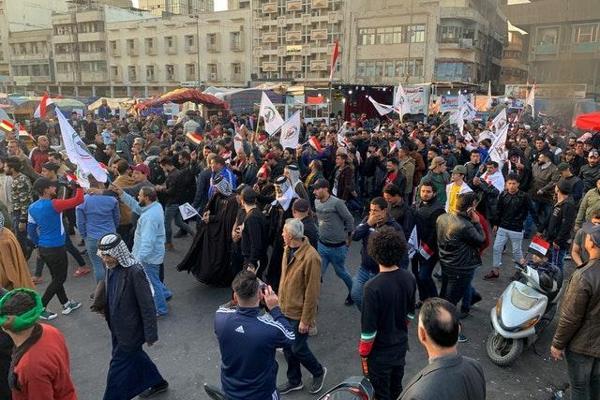Outraged Iraqi protesters storm US Embassy in Baghdad
BAGHDAD-Associated Press


Hundreds of Iraqi mourners stormed the U.S. Embassy in Baghdad on Dec. 31, following deadly U.S. airstrikes this week that killed 25 fighters from an Iran-backed Shiite militia in Iraq.
Shouting “Down, Down USA!” the crowd tried to push inside the embassy grounds, hurling water bottles and smashing security cameras outside.
The U.S. military carried out the strikes on Dec. 29 against the Iranian-backed Kataeb Hezbollah militia, calling it retaliation for last week's killing of an American contractor in a rocket attack on an Iraqi military base that it blamed on the group.
The U.S. attack — the largest targeting an Iraqi state-sanctioned militia in recent years — and the calls for retaliation, represent a new escalation in the proxy war between the U.S. and Iran playing out in the Middle East.
Embassy storming took place after mourners held funerals for the militia fighters killed in a Baghdad neighborhood, after which they marched on to the heavily fortified Green Zone and kept walking till they reached the sprawling U.S. Embassy there.
AP journalists then saw the crowd try to storm the embassy, shouting “Down, down USA!” and “Death to America” and “Death to Israel.”
Security guards were seen retreating to the inside of the embassy. Protesters also were seen hanging yellow flags belonging to the Kataeb Hezbollah militia backed by Iran on the walls of the embassy.
US ambassador and embassy staff in Baghdad evacuated after protesters storm the compound and set some parts on fire, according to Reuters.
U.S. Secretary of State Mike Pompeo said the strikes send the message that the U.S. will not tolerate actions by Iran that jeopardize American lives.
The Iranian-backed Iraqi militia had vowed on Dec. 30 to retaliate for the U.S. military strikes in Iraq and Syria that killed 25 of its fighters and wounded dozens. The attack and vows for revenge raised concerns of new attacks that could threaten American interests in the region.
The U.S. attack outraged both the militias and the Iraqi government which said it will reconsider its relationship with the U.S.-led coalition — the first time it has said it will do so since an agreement was struck to keep some U.S. troops in the country. It called the attack a “flagrant violation" of its sovereignty.
In a partly televised meeting on Dec. 30, Iraqi Prime Minister Adel Abdul-Mahdi told Cabinet members that he had tried to stop the U.S. operation “but there was insistence" from American officials.
The U.S. military said "precision defensive strikes" were conducted against five sites of Kataeb Hezbollah, or Hezbollah Brigades in Iraq and Syria. The group, which is a separate force from the Lebanese militant group Hezbollah, operates under the umbrella of the state-sanctioned militias known collectively as the Popular Mobilization Forces. Many of them are supported by Iran.
